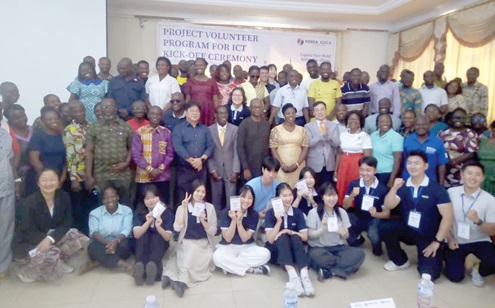
KOICA launches maiden ICT project in Eastern Region
A project to enhance the study of Information, Communications and Technology (ICT) in 14 basic schools and two Technical and Vocational Education and Training (TVET) institutions across the Eastern Regional capital Koforidua, has been officially launched.
It is being funded and spearheaded by the Korea International Cooperation Agency (KOICA).
The programme is being implemented with KOICA's first batch of volunteers to strengthen ICT accessibility and usage, and at the same time build a sustainable ICT community through improved infrastructure and professional training.
The project, estimated to cost $1.17 million, will be implemented in five phases involving the deployment of approximately 60 volunteers.
Beneficiary schools
The 14 basic schools being covered are the Ascension Presby A,B,E and F, the Wesley Methodist A&B, Freeman Methodist A&B, the Rev. Francis Lemmens R/C, the John Bosco R/C, the Eva Maria Catholic Basic, the Effiduase Presby A&B and the St Agnes RC. The two senior high Technical and Vocational Education and Training (SH/TVET) schools are the Effiduase Technical Institute and the Gratis Technical Institute.
Economic growth
Launching the programme in Koforidua, the Country Director of KOICA, Dong Hyun Lee, stressed the critical role being played by ICT in economic growth to facilitate national development.
Citing Korea's example, he indicated that in the 1990s, the country's strategic integration of ICT into its educational system laid the foundation for its success.
Mr Lee stated that Korea's ICT sector had contributed $224 billion in exports, employing over 1.7 billion people.
He added that Korea's deployment journey, which was supported by foreign aid, had inspired the country's commitment to give back to other developing countries such as Ghana, by sharing its expertise in ICT.
Mr Lee, who highlighted Ghana's potential to bridge its ICT education gap through collaborative efforts, was hopeful that the project would foster long-term positive impact to empower local communities and build self-sufficiency.
He indicated that the first batch of KOICA's volunteers had already been grouped into three teams to ensure its successful implementation.
For her part, the Eastern Regional Education Director, Dr Ivy Asantewaa Owusu, outlined the importance of Science, Technology, Engineering and Mathematics (STEM) education, which, to her, should be prioritised for both individuals and national development.
Partnership
She asked school heads and teachers from the beneficiary schools to actively take part and collaborate effectively with the volunteers to ensure the long-term sustainability of the benefits to be derived.
Delving deep into the programme, Dr Owusu stated that the partnership between KOICA and her outfit was a promising step to empower the next generation of Ghanaian students with ICT skills.
She added that by improving infrastructure and providing quality training, it would foster a collaborative learning environment to drive innovation and growth, paving the way for a brighter digital future for the country.
